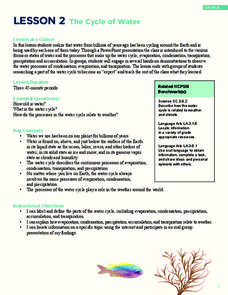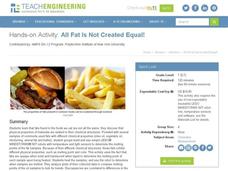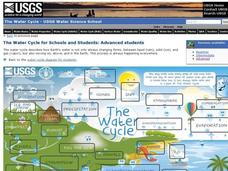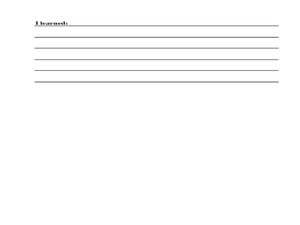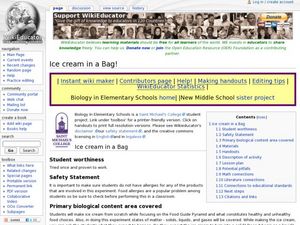Utah Education Network (UEN)
Recipe Terminology Hunt
As your young learners develop into cooking enthusiasts, ensure their success in creating their next culinary masterpiece by preparing them to read and understand basic recipe terminology.
NOAA
The Cycle of Water
Young water cycle enthusiasts discover the water they have been using has been cycling around the earth for billions of years. Through presentations, learners will understand that water has three states and how these forms fit into the...
It's About Time
Polymers
All plastics contain polymers, but not all polymers are plastic. Young chemists make their own polymer and compare the properties to those of other states of matter. After a reading passage, pupils answer analysis questions about natural...
Urbana School District
Thermodynamics
Entropy, it isn't what it used to be. Presentation includes kinetic-molecular theory, heat and internal energy, thermal equilibrium, temperature scales, laws of thermodynamics, entropy, latent heat of fusion, specific heat, calorimetry,...
Science Geek
Element Classes
Introduce your young chemists to alkali metals, alkali earth metals, transition metals, metalloids, nonmetals, halogens, and noble gasses with a presentation that explains the classes of elements and a few facts about each.
Teach Engineering
Capillarity – Measuring Surface Tension
How do cohesion and adhesion work together? The third installment of a nine-part series teaches young scientists the difference between adhesion and cohesion. They also learn how cohesion and adhesion work together to cause capillary...
Jefferson Lab
The Periodic Table of Elements
A study of the periodic table of elements doesn't have to be elementary! Deepen understanding of the building blocks of chemistry with an interactive periodic table. At first sight, the table looks like a standard reference page, but a...
EngageNY
Examples of Functions from Geometry
Connect functions to geometry. In the ninth installment of a 12-part module, young mathematicians create functions by investigating situations in geometry. They look at both area and volume of figures to complete a well-rounded lesson.
Teach Engineering
All Fats Are Not Created Equal
Apply robotics to connect physical properties to chemical properties. Future engineers use robots to determine the melting points of various fats and oils. The robots can do this by measuring the translucency of the fats as they heat up.
US Geological Survey
The Water Cycle for Schools: Advanced Ages
Explore the water cycle in an interactive diagram of the process. The diagram shows how water is a moving system and constantly changing forms. The resourc includes vocabulary words that pupils click on in order to discover more about...
American Museum of Natural History
Create a Compass
Historically, humans have used many methods of finding due north. Using a hands-on activity, learners create their own compasses. They then test their compasses in their neighborhood or to assist with stargazing.
Curated OER
States of Matter and Gas Laws
In this matter worksheet, students review the states of matter and the gas law formulas and equations. Students then complete 7 multiple choice questions and 6 problems.
Curated OER
Nuclear Reactions
In this nuclear reaction worksheet, students determine the missing particle from the reaction and then name that particle. This worksheet has 18 problems to solve.
Curated OER
Changing States of Matter - Making Ice Cream
Students make ice cream as a result of viewing changes of states of matter. In this matter lesson plan, students learn how heating and cooling can effect a state of matter to change.
Curated OER
Physical Changes and States of Matter
Fourth graders study evaporation and condensation as parts of the water cycle. First they determine the similarities and differences between a cup of water and an ice cube before measuring the volume of ice before melting it, and...
Curated OER
Ice Cream Blizzards
Fourth graders explore whether the making of homemade ice cream is a physical change or a chemical change in a lab experiment. Students identify states of matter, describe the physical properties of states, and collect temperature data...
Curated OER
Exploring Phases of Matter
Students discuss and experiment with the phases of water. In this phases of matter activity, students recognize the different states of matter. Students measure and record changes and understand when the state changes.
Curated OER
States of Matter
Students explore the states of water. In this physical science lesson, students use ice and dry ice to observe the changes in the state of matter. Students record the results.
Curated OER
What's The Matter?
Fourth graders accurately describe various states of matter, Through experimentation, they change a variable to create a new state of matter. Students record their observations about the way matter is changed and the changes that occur...
Curated OER
The Water Cycle/States of Matter
Learners engage in a lesson that is concerned with the water cycle and different states of matter. They conduct research using a variety of resources in preparation for taking a quiz. Then students take the quiz in correlation to having...
Curated OER
The Water Cycle (Online Interactive Worksheet)
In this water cycle worksheet, students learn about evaporation, condensation and precipitation by reading a text. Students then answer 12 multiple choice questions. This is an online interactive worksheet.
Curated OER
Around and Around (The Water Cycle)
Students view a video of the water cycle, and make a water cycle baggie. In this water cycle lesson plan, students watch a video, discuss vocabulary, and make a water cycle baggie out of water, salt, ice, and a hot plate.
Curated OER
Sound All Around Us
Students make predictions about how sound is formed. They view and discuss a video that explores sound formation and attempt to identify the origin of different sounds.
Curated OER
Ice Cream in a Bag!
Students follow a recipe to make ice cream. In this ice cream lesson plan, students make their own ice cream by measuring out ingredients and following directions.
Other popular searches
- Liquids and Solids
- Solids Liquids and Gases
- Solids Liquids Gases
- Solids, Liquids, Gases
- Solids, Liquids and Gases
- Solids Liquids Gas
- Pictures Solids Liquids Gas
- Solids, Liquids, and Gases
- Solids Liquids and Gas
- Solids Liquids Gases Quiz
- Matter Solids Liquids
- Liquids Solids



